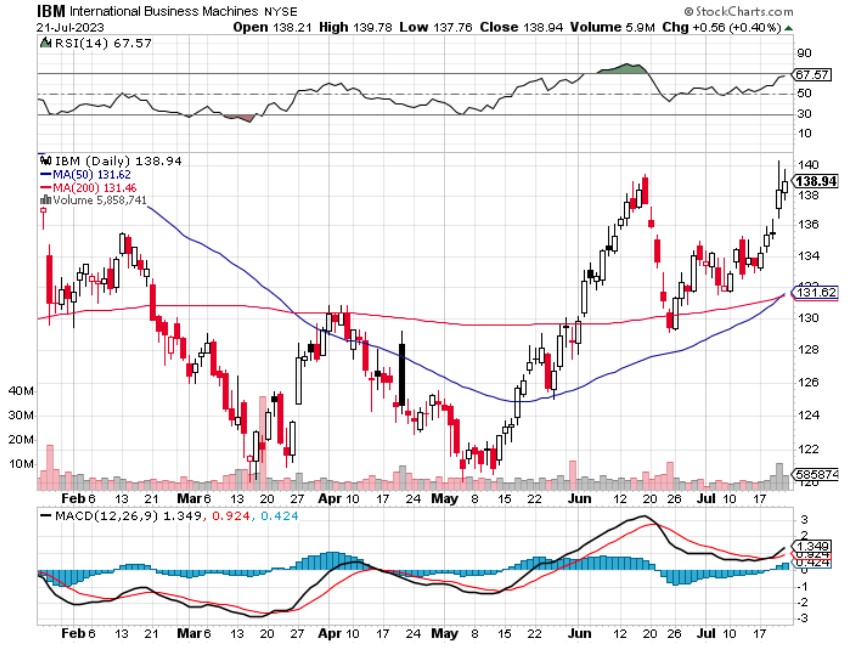AI’S BEST KEPT SECRET
(IBM), (NVDA), (MSFT), (GOOGL), (SNOW), (BASFY), (MITSY)
There's a hidden gem shimmering in the vast landscape of artificial intelligence (AI) investment. A household name tech titan, a company whose bread and butter for years has been the cloud and AI, and, not to forget, one that boasts one of the loftiest dividend yields in the tech playground.
This AI dark horse is none other than IBM (IBM).
Sure, the market has reservations about Big Blue's AI capabilities, but this oversight is akin to missing the forest for the trees. Take a look at chip manufacturer NVIDIA (NVDA), with shares surging 172% this 2023, thanks to the rousing performance of its chips in generative AI applications. Microsoft (MSFT) and Alphabet (GOOGL), the uncrowned kings of AI software, have also ratcheted up a solid 40% each.
But IBM? Well, it's dipped by 8%.
This unexpected downturn is a puzzling enigma, given IBM's metamorphosis over the past three years. When it comes to AI acumen, IBM is a seasoned player, arguably outclassing most contenders, and yet the stock trades at a mere two times forward sales, a stark contrast to Nvidia's 20 times.
And did I mention IBM's staggering dividend yield surpassing 5%? This enterprise has been knee-deep in AI exploits for over 40 spins around the sun.
In the twilight of the 90s, precisely two springs before Nvidia took Wall Street by storm, an IBM supercomputer affectionately termed “Deep Blue” tipped the scales in an intellectual duel of chess against world champion Garry Kasparov.
Fast forward to 2011, and IBM's Watson supercomputer was all the rage, besting human virtuosos on the trivia showdown Jeopardy. Among Watson's foes was the trivia titan Ken Jennings, who now runs the show. Quipping underneath his final Jeopardy response, Jennings humorously declared, "I, for one, welcome our new computer overlords."
Now, it's important to note that IBM's trajectory wasn't always skyward.
Following the Jeopardy spectacle, they dove headfirst into the healthcare sector, seeking to leverage Watson for drug discovery and similar pursuits. However, things didn't pan out as planned, leading IBM to bid farewell to Watson Health for a cool billion in 2022.
Understandably, onlookers mistook this move as IBM's surrender to the AI battlefield. However, nothing could be further from the truth.
Actually, IBM has a unique take on the AI industry. For instance, the company has recently unveiled a revamped avatar of Watson, intriguingly dubbed Watson X.
This fresh-off-the-press venture is structured into three distinct components.
Firstly, Watson.ai collaborates with clients to architect new models and data sets.
Secondly, Watson.data establishes itself as a data repository, thereby challenging contenders like Snowflake (SNOW) on their own turf.
Lastly, Watson.governance functions as an overseer for AI models, ensuring accuracy and accountability and steering clear of misinformation or contentious content.
Notably, IBM isn't gearing up to launch its version of ChatGPT. The company views the AI landscape as filled with immense possibilities. Above the surface, we spot AI chatbots like Microsoft Bing and Google Bard. These public-facing AI applications, though significant, represent just a fraction of AI’s potential.
IBM's primary focus isn't to develop a one-size-fits-all AI model like ChatGPT. Its strategy resembles a master craftsman helping clients carve unique AI sculptures to extract more juice from their data troves. This could involve blending open-source models with the client's proprietary data or crafting bespoke models designed to dance harmoniously with their data.
The company’s blueprint for its AI portfolio includes a cadre of specialized domain-specific data sets, much like a family with diverse talents. Consider the chemistry model IBM is sculpting, drawing from the well of public domain information.
For example, IBM is looking into the possibilities of a partnership with chemical titans like Mitsui Chemicals (MITSY) or BASF SE (BASFY). These corporations have a secret sauce, proprietary data, for manufacturing chemicals.
Would any of them willingly pour their secret sauce into a public model? That would be a resounding no.
However, they'd jump at the chance to customize the chemistry model with their secret sauce. The reward? Swift, insightful answers to client and internal queries, innovative formulations, and ultimately, a nitro-boost to their business model.
Another initiative is IBM’s collaboration with a banking institution to enhance compliance and audit data. The endgame? To satisfy regulators with watertight control measures, all honed internally.
IBM has been flexing its intellectual muscles and churned out 20 of these unique domain models. Its repertoire extends from chemistry and banking to code writing, even making IT operations run smoother than a freshly oiled machine. Its venture into geospatial models morphed with NASA's climate data, aiming to revolutionize weather forecasting.
Clearly, AI could be a golden goose for most companies, generating a staggering $16 trillion for the economy by 2030. It's no secret that IBM harbors the vision of single-digit mid-range revenue growth over time.
While the company doesn't openly declare the new lucrative avenues AI could open for IBM, I think it’s time for us to put on our reading glasses and read between the lines.



